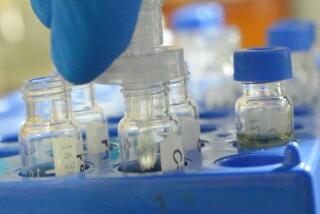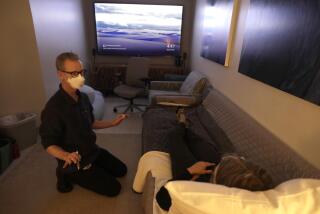Firm Gets State OK to Test AIDS Vaccine : Medicine: FDA did not approve testing in humans. But state’s ‘mini-FDA’ will allow clinical trials.
- Share via
SAN FRANCISCO — In an unusual end run around the U.S. Food and Drug Administration, a small biotech company got the go-ahead Monday from California regulatory authorities to begin human testing within the state of a potential AIDS vaccine called HGP-30.
In the first such instance, the company, Alpha 1 Biomedicals Inc., sought permission to conduct the tests from California’s “mini-FDA,” the Food and Drug Branch of the California Department of Health Services, after the federal regulatory agency failed to approve a 1987 application to test the substance.
A FDA spokesman in Washington said the California decision “was news to us, but under their state law, they can do clinical testing as long as it doesn’t involve any interstate commerce.”
Alpha is based in Washington. Its vaccine is the third possible AIDS drug to be approved for testing in humans under the so-called “California mini-FDA” law enacted in 1987. Unlike Alpha’s, the other applications to California that received the go-ahead were not first presented to the FDA. The intent of the California law was to speed work on possible AIDS vaccines and therapies.
The FDA said its office of biological research and review had examined the application and requested “additional information on the drug’s characterization and safety,” but failed to receive a response.
The drug’s developer asserted that FDA red tape had stalled its potential vaccine in an impossible Catch-22.
“We gave up on the FDA process out of frustration,” said Allan L. Goldstein, chairman of biochemistry at the George Washington University Medical Center and the chief scientific adviser and founder of Alpha. “The additional information requested to allow human testing could only be gleaned by human testing.”
The law under which the vaccine will be tested in California was considered by the FDA such a serious incursion on its turf that then-FDA Commissioner Dr. Frank Young flew to California in August, 1987, to lobby against the legislation’s enactment.
Under the California legislation, all manufacturing, quality control and testing must be done within the state. Though Alpha 1 Biomedical is headquartered in Washington, the company is synthesizing the vaccine at its laboratory in Foster City, Calif.
Even the marine mollusks known as limpets used in the manufacturing process will be harvested from the California coast.
The human tests will be conducted at County-USC Medical Center in Los Angeles and UC San Francisco and will involve 24 individuals who are not infected with HIV, the human immunodeficiency virus that is believed to cause AIDS. The purpose of the vaccine is to prevent being infected with HIV, not to cure those with the disease.
“It will take four to six weeks to manufacture the vaccine but I plan to start recruiting immediately,” said Dr. Peter Heseltine of USC, the principal investigator.
The test is a “Phase 1” trial, meaning that scientists will primarily be evaluating the substance’s potential toxicity and safety. Secondarily, they will look at efficacy and dosage data. Similar trials of HGP-30 are already under way in London.
Vaccines developed by MicroGeneSys Inc. and Bristol-Myers/Squibb are being tested in humans under FDA sanction. Results show they are safe but their effectiveness is still being evaluated.
Polio vaccine developer Dr. Jonas Salk and USC researchers are also using the California law to test a possible treatment for HIV-infected individuals. Salk’s approach involves the use of HIV that has been killed and irradiated.
The Salk group has since applied to the FDA for permission to expand its clinical testing, the FDA official said.
The third possible AIDS treatment that has gotten the go-ahead in California involves transfusing blood products from infected but still healthy individuals to people with full-blown AIDS. This so-called “passive immunotherapy” is snarled in a patent dispute.
Goldstein said his possible vaccine uses a different scientific approach than the other vaccines being tested. HGP-30 is a synthetic copy of a “core” structural protein of the virus. Most other potential AIDS vaccines are so-called “envelope” vaccines, based on the virus’s outer coat.
Most vaccines work by inducing the body to create infection-fighting molecules called antibodies. They work as a preventive measure, helping the immune system recognize bacteria or viruses and eliminating them from the body before they can cause disease.
Goldstein admits that his approach is unconventional, but he theorizes that a “core” vaccine might be necessary for AIDS because the outer coat of the virus is constantly changing, while the core is not.
A powerful ally of Goldstein has been Dr. Prem Sarin, deputy chief of the laboratory of tumor cell biology at the National Cancer Institute, and the chief assistant to AIDS virus co-discoverer Dr. Robert Gallo.
Gallo, on the other hand, has favored the “envelope” approach to vaccine development.
Now that California has approved the go-ahead for the human testing of HGP-30, Alpha plans to apply for a $446,000 grant from California’s AIDS Vaccine Research Fund to conduct the trial.
The fund was established in 1986, before the adoption of the “California mini-FDA” law. For Alpha to receive funding, the Vaccine Research Fund law must be amended to permit funding of vaccines approved for testing by California. The law currently restricts funding to tests approved by the FDA.






